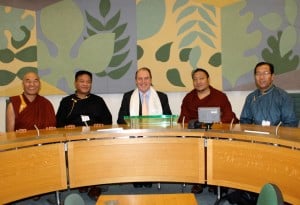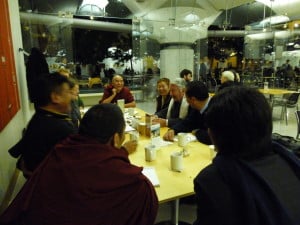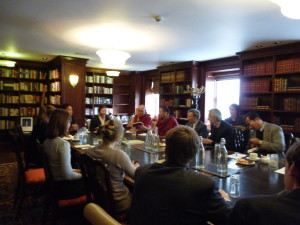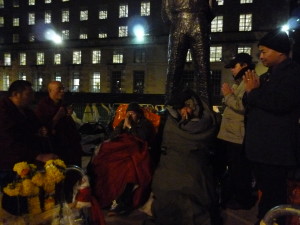The group had a full schedule of meetings with UK Parliamentarians, speaking engagements, and cultural visits in London, including a meeting with British House of Commons Speaker John Bercow, who hosted the Dalai Lama in his chambers in June, 2012. Mr Bercow expressed strong support for the Dalai Lama and the Tibetan cause during the meeting.
The Tibetan delegates from the Parliament in exile were Speaker Penpa Tsering; Dr Khenrab Gyamtso, a Tibetan doctor from Amdo who came into exile in 1991; Mrs Dolma Tsering, who has 26 years of teaching service in the Tibetan community; Ven Geshe Atuk Tseten, who came into exile in 1991 and is studying for a Geshe degree (the highest level of Tibetan Buddhist scholarship) and Ven Thupten Wangchen, head of Tibet House in Barcelona.
Parliamentarian Thupten Wangchen made headline news during the week in the UK as he is the main plaintiff in the Spanish lawsuits that have recently resulted in the Spanish courts ordering arrest warrants against five Chinese leaders for their policies in Tibet (See ICT report: Spanish criminal court orders arrest warrants against Chinese leaders following Hu Jintao indictment for Tibet policies).
During a number of meetings with British Parliamentarians, the Tibetan representatives spoke about the British Prime Minister’s upcoming visit to China, which follows a visit by the Chancellor of the Exchequer George Osborne (See ICT report: Britain emphasizes no policy change on Tibet amid concern over implications of one-sided China deals for UK). They urged British politicians to encourage Prime Minster Cameron to raise Tibet at the highest levels during his visit. The Parliamentarians discussed the current situation in Tibet with MP Simon Hughes, deputy leader of the Liberal Democrats in the government coalition, meeting for butter tea at a Tibetan Buddhist centre in Mr Hughes’ constituency.
Fabian Hamilton (Lab), chair of the All Party Parliamentary Group on Tibet, reiterated his support for the democracy in exile and said that he would urge the Prime Minister personally to talk about Tibet in Beijing.
Penpa Tsering gave a presentation at the Legatum Institute, an independent public policy institute in Mayfair, about the democracy in exile and the devolution of political power by the Dalai Lama, hosted by President of the institute Jeff Gedmin.
The Tibetan delegation was invited to meet Dr John Hall, the Dean at Westminster Abbey, who had hosted the Dalai Lama for an inter-faith religious service on his last visit to London. They were also introduced by the Archbishop of Canterbury at a talk at St Paul’s Cathedral. In May, 2012, the Dalai Lama was presented with the Templeton Prize at the cathedral.
Both Penpa Tsering and Thupten Wangchen were interviewed by the Chinese service of the BBC, and the group attended a debate at the University of Westminster entitled ‘Is the Dalai Lama bad for the West?’ The debate can be viewed at: http://www.youtube.com/watch?v=xLgpudBWyL0&feature=c4-overview&list=UU5wrgpJVEUa-vACRJpwOqEg.
The recent visit by UK Chancellor of the Exchequer to China and announcement of a series of one-sided Chinese deals in critical UK infrastructure has raised concerns about the implications for Britain’s future and its core values of human rights and democracy. The new agreements with China follow a period of diplomatic chill in UK-China relations, which the Chinese authorities blamed on a meeting in May 2012 between the Dalai Lama and UK Prime Minister David Cameron and his deputy Nick Clegg, although there was no evidence of an adverse impact on trade ties.
During the debate, scholar Dr Martin Mills argued that the real questions are not about the Dalai Lama, but about Britain. “It’s a question of how we feel about ourselves and what we want our moral and political culture to be.” Dr Mills pointed out that in terms of trade figures, even with a 20% annual expansion rate, it would take five years before British exports to China caught up with those to Belgium, and more than 15 years before they equalled British exports to Germany. Dr Mills said that this raised the question of whether China is worth the compromises, saying that an authoritarian power should “not have the freedom to come and speak to us on issues of Britain’s civilisation and political culture.” Tsering Topgyal argued that in history, China has always used economic and commercial interests to enforce submission to its agenda, and that today, European nations were often willingly cooperating in their own submission.
During the visit, the group visited a Nepalese hunger striker, Gyanraj Raj, who had camped opposite 10 Downing Street, threatening to starve himself to death if Gurkha concerns are not addressed by the UK government. The two monks in the group carried out prayers for Gyanraj Raj, who was on his 10th day without food. Gyanraj Raj ended his 14-day strike on November 21 after a group of MPs announced plans to hold an inquiry into Gurkha pensions and other issues.(See BBC report: Gurkha calls off hunger strike after MPs launch inquiry).
The visit of the Tibetan Parliamentarians concluded with a wide-ranging debate with the Tibetan community in London, and dinner with local councillors and Nepalese representatives at London’s only Tibetan restaurant, Kailash Momo.





